EDRi writes to EU Commissioner Gabriel about tackling illegal content online
On 28 September 2017, the European Commission published a Communication on “Tackling Illegal Content Online: Towards an enhanced responsibility of online platforms”.
In order to be constructive and support the European Commission in developing a balanced, rights-friendly and harmonised approach to deal with illegal content online in the future, EDRi has written a letter to the Digital Economy Commissioner Mariya Gabriel. We propose the Commission to adopt at least three workstreams: a “fundamental rights framework”, “learning from experience”, and “effective and predictable frameworks for addressing illegal content”.

That Communication puts the emphasis on demanding that online platforms take more action to tackle illegal content online, by preventing, detecting, removing and disabling access to illegal content on a “voluntary” basis. While the Commission encouraged online platforms to adopt proactive measures and to use filtering technologies to that aim, little attention was paid to review mechanisms, counter-productive effects, mitigation or identification of problems, and legal predictability, among others.
The Commission’s Communication was widely criticised by EU policy-makers like Members of the European Parliament (MEPs) Marietje Schaake and Julia Reda, as well as European companies, EDRi, EDRi members, other civil society organisations, and academics. For example, Daphne Keller from Standford Law School expressed her concerns on filtering technologies, as well as on the risk of over-removal of content that can emerge from the compliance of online platforms with the Communication’s guidelines.
So, what is needed? Three workstreams that build a diligent, rights-based and comprehensive approach to this problem, creating methodologies to develop (1) an agreed understanding of the fundamental rights framework, (2) a structured approach to learning from experience and (3) a methodology for building effective policies in the future.
1. Fundamental rights framework
First, we recommend developing clear guidelines on government or European Commission compliance with the requirements of Article 52.1 of the Charter of Fundamental Rights of the European Union when they design, promote or participate in “voluntary” or mandatory measures that may restrict fundamental rights. Article 52.1 of the Charter establishes that any limitation on the exercise of fundamental rights needs to be provided for by law, and respect the principles of proportionality and necessity. Any regime for tackling illegal content on the internet needs to particularly ensure a robust protection for due process, safeguards against removal of legal content and provide an effective right to remedy.
2. Learning from experience
Secondly, we propose that the Commission conduct a neutral assessment of what has worked and hasn’t worked regarding the experience of EU and Member States initiatives to deal with illegal content online. This could cover a full range of impact assessments, including both on fundamental rights and on the public policy results of the measures that have been attempted.
3. Building a flexible, effective approach to illegal online content
Thirdly, we strongly encourage the Commission to develop an effective and flexible methodology for tackling different types and areas of illegal content online. This would ensure a diligent approach to fundamental rights, problem identification, review processes and contingencies. The methodology could include issues such as how the necessity, proportionality and predictability of the measures are guaranteed, risks for citizens, providers and governments and which review, redress and oversight mechanisms are available.
We hope that the letter can be a first step towards building a more effective approach, to protect the principles on which our democracies are based and to ensure a more effective, comprehensive approach to illegal online content.
Letter: A coherent and rights-based approach to dealing with illegal content (20.10.2017)
https://edri.org/files/letter_coherent_rightsbasedapproach_illegalcontent_20171020.pdf
Commission’s position on tackling illegal content online is contradictory and dangerous for free speech (28.09.2017)
https://edri.org/commissions-position-tackling-illegal-content-online-contradictory-dangerous-free-speech/

